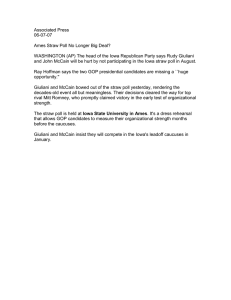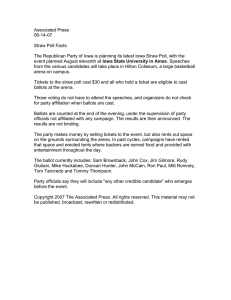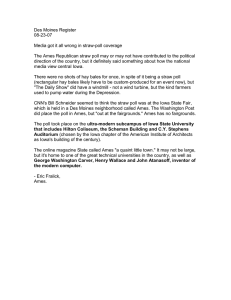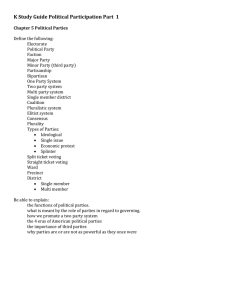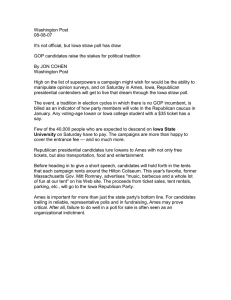PBS 07-03-07 With Two Top GOP Candidates Out, Role of Iowa Straw...
advertisement
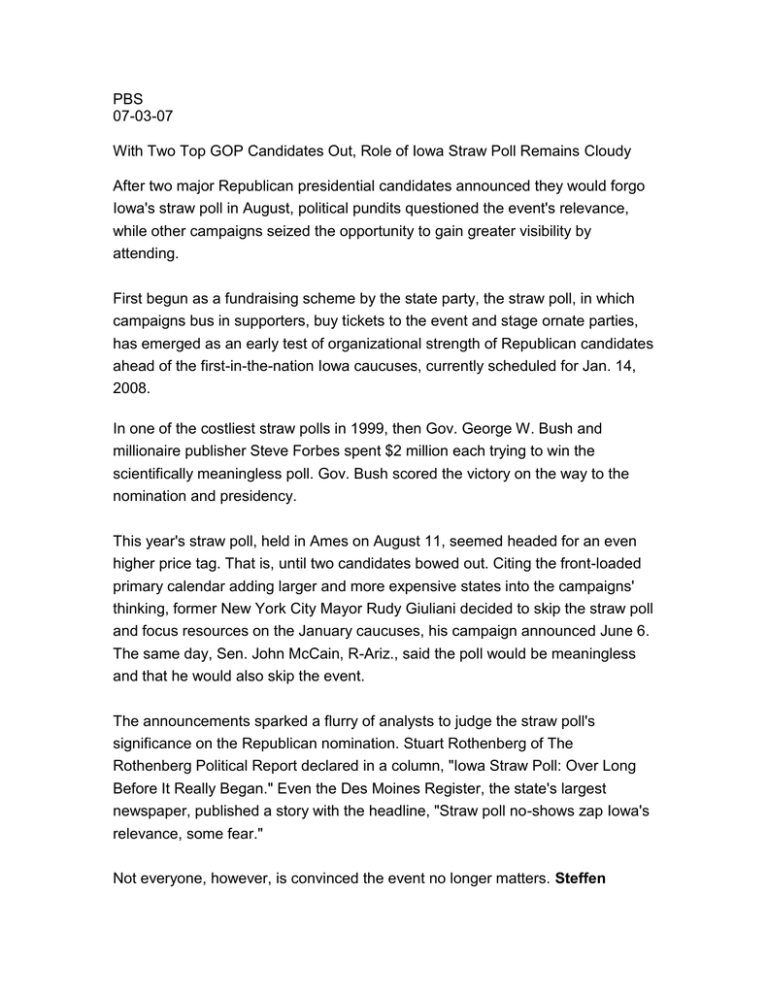
PBS 07-03-07 With Two Top GOP Candidates Out, Role of Iowa Straw Poll Remains Cloudy After two major Republican presidential candidates announced they would forgo Iowa's straw poll in August, political pundits questioned the event's relevance, while other campaigns seized the opportunity to gain greater visibility by attending. First begun as a fundraising scheme by the state party, the straw poll, in which campaigns bus in supporters, buy tickets to the event and stage ornate parties, has emerged as an early test of organizational strength of Republican candidates ahead of the first-in-the-nation Iowa caucuses, currently scheduled for Jan. 14, 2008. In one of the costliest straw polls in 1999, then Gov. George W. Bush and millionaire publisher Steve Forbes spent $2 million each trying to win the scientifically meaningless poll. Gov. Bush scored the victory on the way to the nomination and presidency. This year's straw poll, held in Ames on August 11, seemed headed for an even higher price tag. That is, until two candidates bowed out. Citing the front-loaded primary calendar adding larger and more expensive states into the campaigns' thinking, former New York City Mayor Rudy Giuliani decided to skip the straw poll and focus resources on the January caucuses, his campaign announced June 6. The same day, Sen. John McCain, R-Ariz., said the poll would be meaningless and that he would also skip the event. The announcements sparked a flurry of analysts to judge the straw poll's significance on the Republican nomination. Stuart Rothenberg of The Rothenberg Political Report declared in a column, "Iowa Straw Poll: Over Long Before It Really Began." Even the Des Moines Register, the state's largest newspaper, published a story with the headline, "Straw poll no-shows zap Iowa's relevance, some fear." Not everyone, however, is convinced the event no longer matters. Steffen Schmidt, a political science professor at Iowa State University in Ames, said the straw poll will still serve as an indicator of how Iowa Republican activists are lining up with the candidates that do participate. And not all the candidates have pulled out. Former Massachusetts Gov. Mitt Romney, Sen. Sam Brownback, R-Kan., former Arkansas Gov. Mike Huckabee, Rep. Tom Tancredo, R-Colo., Rep. Duncan Hunter, R-Calif., Rep. Ron Paul, RTex., former Wisconsin Gov. Tommy Thompson, and Illinois businessman John Cox have all pledged to participate, and may be joined by former Sen. Fred Thompson, R-Tenn., whose speculated entry into the GOP field could shake up the top tier. While he has neither officially declared his candidacy nor committed to the straw poll, Fred Thompson's advisers have talked to party leaders in Iowa about the process, according to Mary Tiffany, communications director for the Republican Party of Iowa. His presence in the straw poll could be a key factor in the amount of attention given to the event. The national media, with little else to cover as the campaign cycle slows in August, will still report on the straw poll, Schmidt expects. Schmidt says the likely media attention could give a second-tier candidate a chance to emerge from Ames with a major boost to their chances. According to analysts, as the straw poll line-up currently stands, Huckabee and Brownback have the potential to galvanize church-related groups in Iowa with their long records on issues important to social conservatives, while Tancredo could stir up support among Iowans who agree with his hard-line stance on immigration policy. The Huckabee campaign has moved staff up to Iowa from Little Rock in preparation for the straw poll, which has "been a focus of our campaign ever since we announced," said press secretary Alice Stewart. "We are really ramping up our efforts there in Iowa and organizing groups in all the counties to mobilize and go out and attract Huckabee supporters," Stewart said. Brownback also plans to compete "very aggressively" in the straw poll, and Iowans on campaign trail are appreciative of that commitment, said John Rankin, Brownback's Iowa communications director. "You can't win the presidency by skipping Iowa, and Sen. Brownback doesn't think you can win Iowa by skipping Ames," Rankin said. The Ames straw poll has winnowed the field in past election cycles. The 1999 event that saw the poll give a boost to Mr. Bush also killed the presidential aspirations of Lamar Alexander, who dropped out of the race shortly after a sixth place finish in the straw poll. The straw poll was a less accurate predictor in 1995. Phil Gramm and Bob Dole tied for first, but Gramm would later finish fifth in the caucuses. Dole won the 1996 Iowa caucuses, while Pat Buchanan, who placed third in the summer's straw poll, came in second. Surprises have also emerged from the straw poll, such as Christian broadcaster Pat Robertson's win over Bob Dole in 1987. Robertson would come in second to Dole in the 1988 caucuses, while eventual nominee and future President George H.W. Bush would come in third. Tiffany at the Republican Party of Iowa said the state's party leaders feel confident that the straw poll will garner just as much media coverage and draw just as many participants -- 35,000 to 40,000 are expected -- as in past years. The event raised roughly $1 million for the party in 1999, and this year's profits will go towards the January caucuses, as well as future party activities such as the Ronald Reagan Dinner and upcoming congressional races. Still, disappointment over Giuliani and McCain's absence is already having an impact on activists. A June 19 poll of previous Iowa caucus participants by Eagle Media Group LLP in Des Moines found that 51 percent were less likely to support Giuliani or McCain given their decision to skip the straw poll. "I think the campaigns need to have an understanding of the political process regardless of what anyone wants to say. The straw poll is part of the grassroots organization that goes on this state that's different from other states," Tiffany said.
